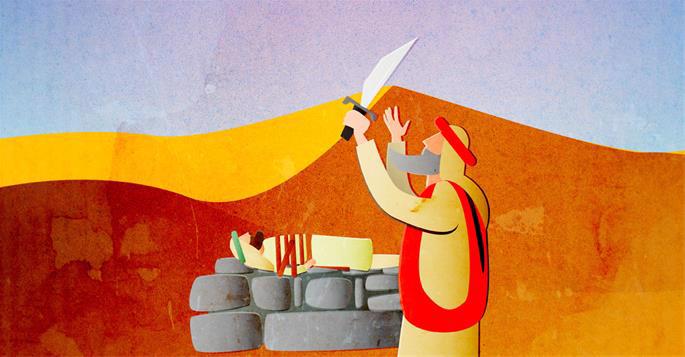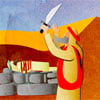And it came to pass after these things, that G‑d tested Abraham, and He said to him, "... Please take your son, your only one, whom you love, Isaac, and go away to the land of Moriah, and bring him up there as an offering on one of the mountains, of which I will tell you...."
Genesis 22
[In the Binding of Isaac] lies the entire glory of Israel and their merit before their Father in Heaven. And that is why it pervades our prayers every day.
Rabbi Don Isaac Abarbanel (1437-1508)
Why did G‑d test Abraham? Why does He test us? Why does an all-knowing G‑d need to test anybody? Shouldn't He know what is in our hearts without testing us?
A test is any situation that demands more from you than you think you have. In a test, if you would use your rational mind you would say, "This is impossible. This is not what I bargained for. I don't have to do this because it is not within my skill set. It is beyond who I am."
You don't pass a test with understanding, with reason. You pass a test with rock solid faith and blind perseverance.
Tests are closely related to miracles. In fact, in Hebrew they are practically the same word.
A miracle is when G‑d breaks out of his standard pattern of natural law and demonstrates unlimited powers. A test is when G‑d invites you to do the same. That is why people who pass tests cause miracles to happen — G‑d is mirroring them.
There are different kinds of tests. All of them break barriers. Some tests take a person past old habits that bridle him. Others pull out of him new strength, a tenacity, a deep confidence in his purpose and the inherent goodness within the world.
The ultimate test is that which takes a person beyond the ultimate barrier: The barrier between creation and Creator. Such was the test Abraham passed when he was asked to offer up his son Isaac.
Abraham had passed many tests before — nine in total. As a young man, he had chosen certain death in a fiery furnace over worship of the evil demagogue, King Nimrod, and was miraculously saved. Throughout his life, he had never questioned G‑d's justice, despite his many tribulations. Except for once, when he demanded justice for the inhabitants of Sodom and Gemorrah — and that itself was how he passed another test.
But the test of offering Isaac was a class in itself. Because this test made absolutely no sense.
Throw yourself in a fiery furnace rather than worship a megalomaniac who thinks he is a god — you've made a statement and you've got it out there. The same with all the other tests — they were ways to promote a cause, to publicize to the world the faith of Abraham. And as such, there always lurked a doubt that perhaps, just perhaps all this was tied to Abraham's ego. Because what could be a greater accomplishment than being the founder of the faith of Abraham?
Turn the whole world on its head and you'll be the most significant man in history. Isn't that worth fire and high water, and even death itself?
But the Akedah ("Binding" of Isaac) didn't fit that profile. The Akedah flew in the face of everything Abraham ever stood for: that G‑d is good and kind, that He keeps His promises and has a destiny for His world. All this is out the window when G‑d says, "Abraham! Remember that son I promised you, for which you waited for so long? The one about whom I promised he is destined to carry on all that you began so that it will continue until eternity? Remember how I told you to listen to Sarah against your own judgment and send Ishmael away so that this other son could flourish? The son who you have fostered with your wisdom and trained for his destiny these many years? The son of your old age, that you love more than any father has ever loved a son?
"Take him to the land of Moriah and raise him up for a burnt offering on one of the mountains I will show you there."
No explanation. No consolation. No excuses. Just do it. Turn around and destroy everything you have built until this day so that there will never be a chance to rebuild.
A mindless act.
Perhaps something could be salvaged. Perhaps Abraham would demonstrate to the world to what extreme a man could have faith in G‑d. At least some purpose, some glimmer of meaning.
But no. Because, at the scene of Abraham's most heroic stand, there was not a soul to witness. No armies, no throngs of disciples, no impressionable bystanders, not even the two young attendants he had taken with him — he had told them to stay behind at the foot of the mountain. The most dramatic moment of Abraham's career was performed in chilling solitude.
If so, on that day, Abraham passed not one, but ten tests. For in case there had been any doubt beforehand, now we could say in retrospect, "All that fortitude, tenacity, iron faith that Abraham showed in the face of challenge, it wasn't just another human creature with his ego tied to a cause. It wasn't just another hothead zealot or a gullible believer who must believe because, well, everyone has their crutch. It was real."
Abraham was no longer just another being seeking its own fulfillment. In the language of our sages, Abraham had become a chariot — a vehicle for a Higher Will. In modern lingo, we would say he was "transparent." A window through which you saw G‑d.
Interestingly, Abraham's body was a step ahead of his mind in this regard. Having received his mission at night, Abraham awoke early and plunged into his task. He prepared everything, the wood, the knife, the igniter. All was calculated, not in a drunken stupor of religious fervor — carefully, mindfully.
For three days, Abraham walked until he found that place. He kept quiet, he did not reveal his goal, neither was he swayed from walking towards it. Even once his son had discovered his awful fate in this journey, even then his determination did not falter. Inside: questions, struggle, confusion. On the outside: firm footsteps, a wise, fatherly, noble countenance.
When Abraham built an altar of stones, his hands did not falter. As he set the wood, as he bound his son and lifted him upon the altar, he did not slip, he did not cry. Only when he needed the knife, only then his hand refused, "And he sent forth his hand and grasped the knife." His hand knew what his mind did not — that this was not the Divine Will, that Isaac was only to be raised as an offering, but not, G‑d forbid, to be slaughtered. But Abraham's mind did not yet know, and so he "set forth his hand," against its will, by force.
In the end, there was no sacrifice of Isaac. "I told you to offer him up," G‑d said, "and you did. Now take him down." But the gateway was opened. It became possible for other human beings to transcend the limitations of the ego and become a clear channel for the Divine Will in our world.
Close to 3700 years have passed. We, Abraham's child, are still alive. Many pages of our history are drenched in the blood of martyrs led to the slaughter on an altar in G‑d's name. Not only rabbis and saintly leaders, but mainly common, simple Jews.
In truth, many of them would much rather have lived. They did not necessarily see themselves as martyrs furthering a cause. They did not die to save their principles or because life without those principles would be a life not worth living. Neither did they die in order to attain eternal reward.
They simply found themselves incapable of ripping apart their bond to the G‑d of Israel. As though someone had told them to rip their own hearts out from their own chests. At that moment, all the world disappeared from before them; there was only the one truth of their bond to the One G‑d and all else was meaningless.
As Don Isaac Abarbanel, leader of Spanish Jewry at the time of their expulsion, writes, "I saw many Jews, men, women, and even young children, tortured and burned at the stake in His Holy Name and I bear witness that at that time they did not scream or utter any expression of pain, but left this world in serenity and peace."
This is the strength of Abraham and Isaac within us. For they opened the channel by which this power comes down to us to this day. This power not only to die, but to live as Jews. This power to remain Jews despite every adversity G‑d could throw at us. For this is the greatest miracle: that in this day and age there remain any Jews at all, that we still have each other, our Torah and our heritage.
It is a power beyond nature, beyond the ego of a created being. And with it we are eternal.






Join the Discussion